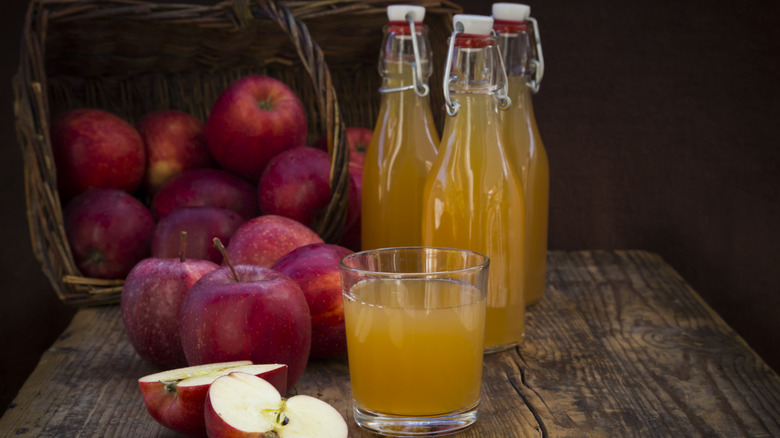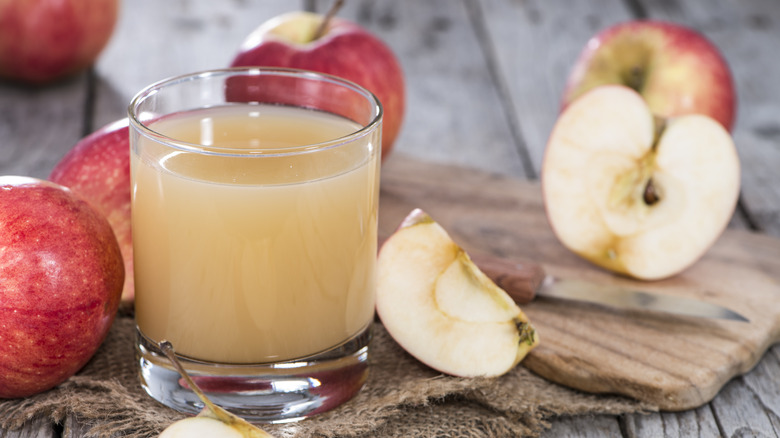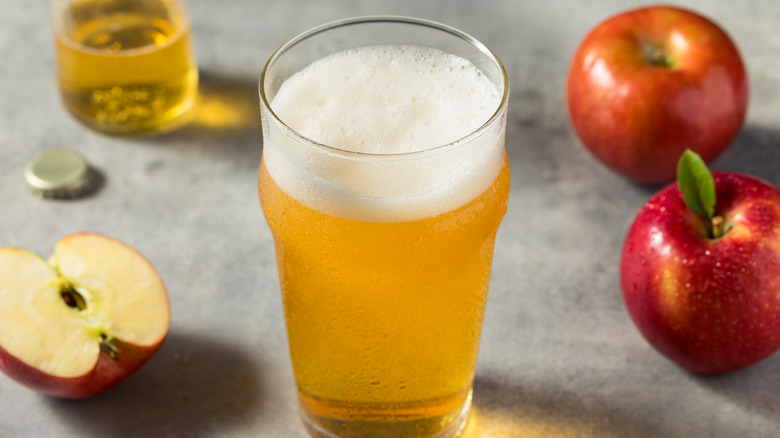The Exact Difference Between Apple Juice And Apple Cider
Biting into a crisp one whole is plenty satisfying, but apples are also a seriously drinkable fruit. Apple juice by itself tastes great, plus it's a great mixer, especially with tequila. Meanwhile, apple cider is classic as a hot beverage when temperatures drop, but it can also be enjoyed on ice. It's also an ideal mixer (for beer) and a convenient ingredient for making an autumnal cider pancake syrup to go with a stack of flapjacks.
You'd be forgiven for confusing the two given the similarity of their names, but apple juice and apple cider are two separate things entirely. The key difference is that generally speaking, apple juice is a more processed product than apple cider. The unique way each is made affects their appearance and taste, giving apple cider a more robust flavor and consistency.
Another notable distinction between the two is that apple juice tends to last longer thanks to the extra steps involved in its production (which can include additives). As a result, it is sometimes considered to be less nutritiousand less natural than cider.
Apple juice vs apple cider
While it is true that apple juice and apple cider both start from apples, that is just about where the similarities end. Apple juice is specifically made by pressing apples and filtering out the solids. Oftentimes, it is then sweetened, though unsweetened apple juice is also available. It can also be watered down and treated with preservatives to help with shelf life. The result is a translucent, light gold liquid with a faintly fruity sweetness.
Apple cider, on the other hand, is simply the result of pressing fresh apples without filtration or added ingredients. It has a richer, more rounded, tangier fruit flavor, a darker, golden brown color, and is opaque. Plus, there is usually some visible residue at the bottom of a jug of apple cider which is not found in apple juice.
Another big difference between apple juice and apple cider is availability. Apple juice can be easily found in stores year-round and is valued because of its long shelf life, and because it can be sold refrigerated or unrefrigerated. Meanwhile, apple cider is thought of as seasonal, and the fact that it is commonly sold unpasteurized means its shelf life is noticeably shorter.
Alcoholic vs nonalcoholic apple cider
Depending on where you live, the word "cider" might be used to refer to an alcoholic beverage. In Europe, cider typically refers to an alcholic drink. In the United States, however, the word has a more complicated history. Prohibition put a major strain on the alcholic cider industry, resulting in the marketing of sweet nonalcoholic cider that is known and loved to this day.
This is often a point of confusion, leaving some to wonder if apple cider is in fact an alcoholic drink. The truth is that apple cider is typically non-alcoholic. Alcoholic cider, also known as hard cider, is the result of yeast being added, which will then turn the sugar present in the liquid into alcohol.
Nonalcoholic cider can turn into hard cider under certain conditions. If the apple cider is not pasteurized and not refrigerated, it will eventually start to ferment. Over time, it will become alcoholic naturally. However, apple cider is typically sold in stores Stateside as a nonalcholic beverage. When in doubt, check the label. An alcoholic apple cider will be labeled as a hard cider.


